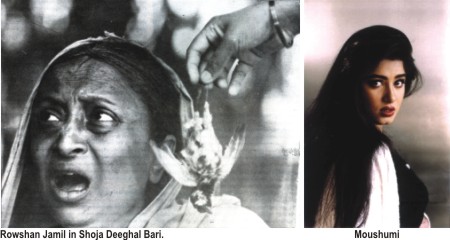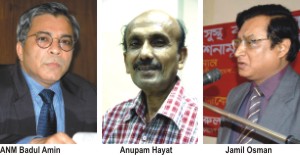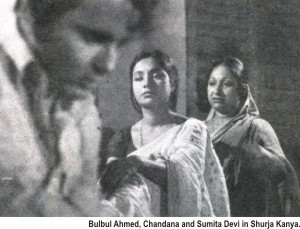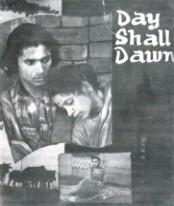|
Special Feature
Saving the Silver Screen
Ershad Kamol
One of the key features of contemporary Bangladeshi mainstream films, made with a shoestring budget, is that it releases substandard vulgar movies. Besides this, indiscriminate copying of films made in the South Asian subcontinent is done; films in which characters and plots eerily resemble that of contemporary Hindi or Urdu movies; so much so that, at times, the costumes and angles of the camera and even short division of the original and the copy remain the same.
Because of the rampant release of such films, which portray vulgar and violent scenes, not only have the viewers showed their back to the movie theatres, many renowned actors, directors, producers and technicians have also left the industry, as they have refused to compromise with the ongoing trend of obscenity.
The gradual decline in the standards of our cinema has led to the closure of many popular movie theatres. A few years ago the number of movie theatres was about 1100, which at present is 700. It is indeed in this vicious web that the local cinema has found itself caught.

The situation, however, has improved over the last two years, thanks to the drive against obscenity led by the Bangladesh Film Development Corporation (BFDC). Executed by the joint forces, the drive has seen some notable success: Those involved in making and distributing substandard vulgar movies have left the industry. The films that made profits over the last few months are all decent, entertaining ones; of these include: "Priya Amar Priya", "Mone Prane Achho Tumi", "Hridoye Amar Naam", "Amader Chhoto Shaheeb", "Koti Takar Fakir", "Ek Takar Bou", "Moner Shathey Juddho", "Katha Dao Shathi Hobey", "Jiboner Cheye Dami" and “Beyain Shab”. A majority of the viewers of these movies is women, which shows that female-viewers are coming back to the theatres that they quietly avoided a few years ago.
Everyone involved has appreciated the drive. Dubbing the step against vulgarity the beginning of a 'new era', filmmaker Sohanur Rahman Sohan, vice president of Bangladesh Film Directors Association, says, “A fresh flow of decent movies has began after the drive against vulgarity. Many of the films have become blockbusters.”
 Though vulgarity has been controlled, the quality of our films has still left much to be desired. Bangladeshi film industry remains in the grips of those who are after a few quick bucks and do not mind coming up with cheap, crude ideas when it comes to entertainment. In fact, most of the directors in Bangladesh have little aesthetic sense, understanding the distinctive language of cinema is a far cry. Though vulgarity has been controlled, the quality of our films has still left much to be desired. Bangladeshi film industry remains in the grips of those who are after a few quick bucks and do not mind coming up with cheap, crude ideas when it comes to entertainment. In fact, most of the directors in Bangladesh have little aesthetic sense, understanding the distinctive language of cinema is a far cry.
Though BFDC was established in 1957 and National Award for filmmaking was introduced in 1975, only a handful of Bangladeshi films -- "Jago Huya Savera" (1959), "Shutorang" (1964), "Abirbhab" (1968), "Shurja Deeghal Bari" (1979) and "Dahon" (1985)-- have bagged awards competing in the International Film Festivals.
Citing a comment of legendary Spanish filmmaker Luis Bunuel on world cinema, renowned film critic and cine journalist Anupam Hayat says, "Eighty percent of our films should not have been made. Here, in most of the cases filmmaking is a kind of business, which is meant to generate money. No one bothers to make films for the welfare of the country, society and the masses, they only seek personal benefits.
"In contrast to the 112-year-old global cinema, which deals with diversified subjects, Bangladeshi cinema handles only a few stereotypical subjects. In almost all instances, these films are made haphazardly; often because of lack of technical know-how. If this remains so, what are the prospects for our film industry?" questions Hayat, who is also the author of "Bangladesher Chalachchitrer Itihash", a brief history of Bangladeshi cinema.
 Hayat adds that because of the paucity of knowledge on cinematography many of the popular films made by the Bangladeshi filmmakers cannot be considered 'cinema' at all. "Most of the films are akin to dialogue based stage plays made in 35 mm format. The filmmakers regard movies as a means of storytelling, rather than creating visual magic. Hardly any Bangladeshi movies demonstrates the touch of modern techniques such as intellectual montage, expressionism, avant garde, or surrealism. Most of the filmmakers lack social commitment and the aesthetic sense to make quality movies," he adds. Industry insiders cannot but agree. Many feel that, Dhaliwood is struggling over the years because of a shortage of potential actors, directors and technicians. Hayat adds that because of the paucity of knowledge on cinematography many of the popular films made by the Bangladeshi filmmakers cannot be considered 'cinema' at all. "Most of the films are akin to dialogue based stage plays made in 35 mm format. The filmmakers regard movies as a means of storytelling, rather than creating visual magic. Hardly any Bangladeshi movies demonstrates the touch of modern techniques such as intellectual montage, expressionism, avant garde, or surrealism. Most of the filmmakers lack social commitment and the aesthetic sense to make quality movies," he adds. Industry insiders cannot but agree. Many feel that, Dhaliwood is struggling over the years because of a shortage of potential actors, directors and technicians.
"Bangladeshi filmdom is earning such an ill repute that young talents are not at all interested in Dhaliwood. I rarely come across young talented actors nowadays, as they are interested in TV plays, rather than films," Sohan says.
Moushumi, popular Dhaliwood diva says, “We have a dearth of skilled actors, directors and technicians. It's a good sign that a few of the renowned filmmakers are making comebacks. But, we need more talented people. We should concentrate on developing the skills of artistes, filmmakers and technical hands in Dhaliwood.”
 |
Poster of Jago Huya Savera. |
Lack of talent in the industry, shortage of money, absence of good hands, video piracy and substandard movie theatre are behind the ongoing slumped trade in Bangladeshi cinema industry. To overcome the situation, Ministry of Information and its autonomous directorate body BFDC have chalked out a holistic approach for the improvement of the film industry in Bangladesh, which is expecting a pick-up.
Under the leadership of its current Secretary Jamil Osman, the ministry plans to inaugurate a film institute at the National Institute of Mass Communication (Nimco), which was scheduled to see the light of day 23 years ago.
Osman says, "For the development of the film industry there is no alternative to a film institute in the country. The proposed film institute has already been approved by the Chief Adviser and hopefully it will be inaugurated in the beginning of next year after getting clearance from the Ministry of Finance and Ministry of Establishment since we have proposed to change the name and organogram of existing Nimco. The proposed name of the institute is Jatio Ganomaddhyam O Film Institute.”
He further adds that the proposed course design and curriculum have been submitted involving the existing resource persons who have obtained higher education on cinema from foreign institutes. “Initially,” he says, “We hope to offer diploma course at the institute. After purchasing more equipment we are planning to offer graduation courses on different disciplines of filmmaking. We hope to include foreign experts as guest lecturers at the institute."
The proposed institute will offer diploma in four disciplines: Direction and Screenplay, Editing, Motion Pictures and Photography, Sound Recording and Engineering. Shamim Chowdhury, director of Nimco, is the co-coordinator while Badal Rahman and Manzar-e-Hasin Murad are the course designers.
 |
| Soovas Dutt and Kabori in Shutarang. |
Another major crisis in the Bangladesh film industry -- a dearth of quality actors -- also needs to be resolved. To zoom in on talented film actors, BFDC has organised a talent hunt programme titled "Super Hero Super Heroine". The organisers claim it as to be the biggest programme of its kind in Bangladesh. As per the memorandum of understanding (MoU) between marketing solution provider Market Access and the BFDC, the former will run the programme on behalf of the latter.
After selecting 10 actors and 10 actresses, Market Access will train the young talents to perform in mainstream movies. On the talent hunt programme, ANM Badrul Amin, managing director of BFDC says, "I'm satisfied with the standard of participants at the talent hunt, most of whom are university students. We are emphasising on the educational background of the participants. We have included leading directors and producers of the country as the jury and many of them have told me that they are going to cast a few of the participants in their upcoming movies."
Tanvir Khan, producer of Super Hero Super Heroine programme that ntv airs, says that initially 32,000 applied for the talent hunt. “After the third session of the competition 60 are participating. The selected 10 pairs of actors will be offered month-long camp training on required various techniques to perform in cinema such as acting, dancing, fighting and make-up. Ultimately one pair will be selected as the winner of grand gala,” he says.
Sohan is a judge at the talent hunt; he says, "We will get at least five or six quality actors from the talent hunt programme which will help our industry to solve the crisis of quality actors."
However, it will not be an easy task for the ministry and the BFDC to solve the other problems such as video piracy, improvement of movie theatres. Pirated CDs of movies are available in the market. When people buy these CDs and watch them at home, our film producers are deprived of royalty and the existence of our movie theatres are further threatened.
Stopping video piracy was one of the two Terms of Regulations (TOR) of the task forces drive initiated by the BFDC. While appreciating the current drive against obscenity film producers also want bold steps to be taken against piracy of films. Nasiruddin Dilu, former president of Bangladesh Film Producers and Distributors Association says, “We want the task forces to raid stores at places like the Stadium Market where pirated VCDs of films are sold.”
ANM Badrul Amin, managing director of the BFDC says that the fact that the problem lies with many producers who do not get registered under the 'Copyright Act 2000', the legal basis of claiming the ownership of the property. “For this reason we can arrest the people involved in piracy but can't always take proper actions,” he says.
Calling the situation complicated, he says, “'Copyright Act 2000' is under the jurisdiction of Ministry of Cultural Affairs. But, we feel the act should be up-graded to incorporate the film producers. And the producers should also follow the act."
Meanwhile, the film producers has also pointed that the number of films released has decreased last year after the drive against vulgarity has been launched. The BFPDA office sources confirm that while last year 96 movies were released, this year the number has come down to 50. Many corrupt producers who used to make vulgar movies have gone into hiding. The BFDC has also stopped providing its facilities in credit.
"When the Film Censor Board bans a movie on the ground of vulgarity, copying and violence we have to face huge loss. Producers of the banned films do not pay us the service charges including reel, development, and camera and editing costs."
Directors and producers demand that for the improvement of the industry, besides providing grants for making films, government should patronise the industry as a business concern, since the BFPDA is a grade one member of the Federation of Bangladesh Chambers of Commerce and Industry.
On this issue Jamil Osman says, "Our role is promotional, but we can't be a business partner with the private sector. Moreover, groupings of the producers remain a major concern for us as we don't know whom to talk with on the issue of funding. Yet this year we have given grants for three movies. We hope to continue the support. We have also taken the fund issue seriously and it depends on the availability of fund."
The secretary also suggests the producers and directors to approach the corporate bodies to patronise films. He says, "If the producers come with concrete proposals on the issue we will help them to get funds from the corporate sectors, since patronisation of films by the private sector is a common practice in the neighbouring countries."
To turn Dhaliwood into a cash cow again, producers and directors demand renovation of movie theatres. Because of the shortage of fully functional movie theatres, the urban middle-class has stopped going to movies, rather they are interested to watch movies in the comfort of their homes. The government and corporate giants can play a major role in promoting the industry by renovating the existing theatres and building new ones.
The Information secretary says, "We have talked with the hall owners since the film business depends on quality of movie theatres. But, again the problem is that representatives from the producers should participate at the meeting. In fact, they should force the owners for improvement of cinema halls for their own interest."
Meanwhile filmmakers and producers are suggesting the creation of a market amongst the Bangladeshi expatriates. Eminent Indian director Goutam Ghose in an interview with the Daily Star also suggested the BFDC and Kolkata's Tollygunge to produce films jointly, for the Bangla speaking regions of the sub continent.
Jamiul Osman says that his ministry does not have any problem with such a venture. “But, such an agreement should be between two countries. In that case Tollygunge should approach the Central Government of India. We will always consider such a proposal. Still, there is no bar to make joint productions in private level which can run simultaneously in both countries", he says. Only time can tell whether these initiatives will be able to salvage the country's embattled film industry, which was supposed to hold the dreams of 160 million people.
Copyright
(R) thedailystar.net 2008
|
